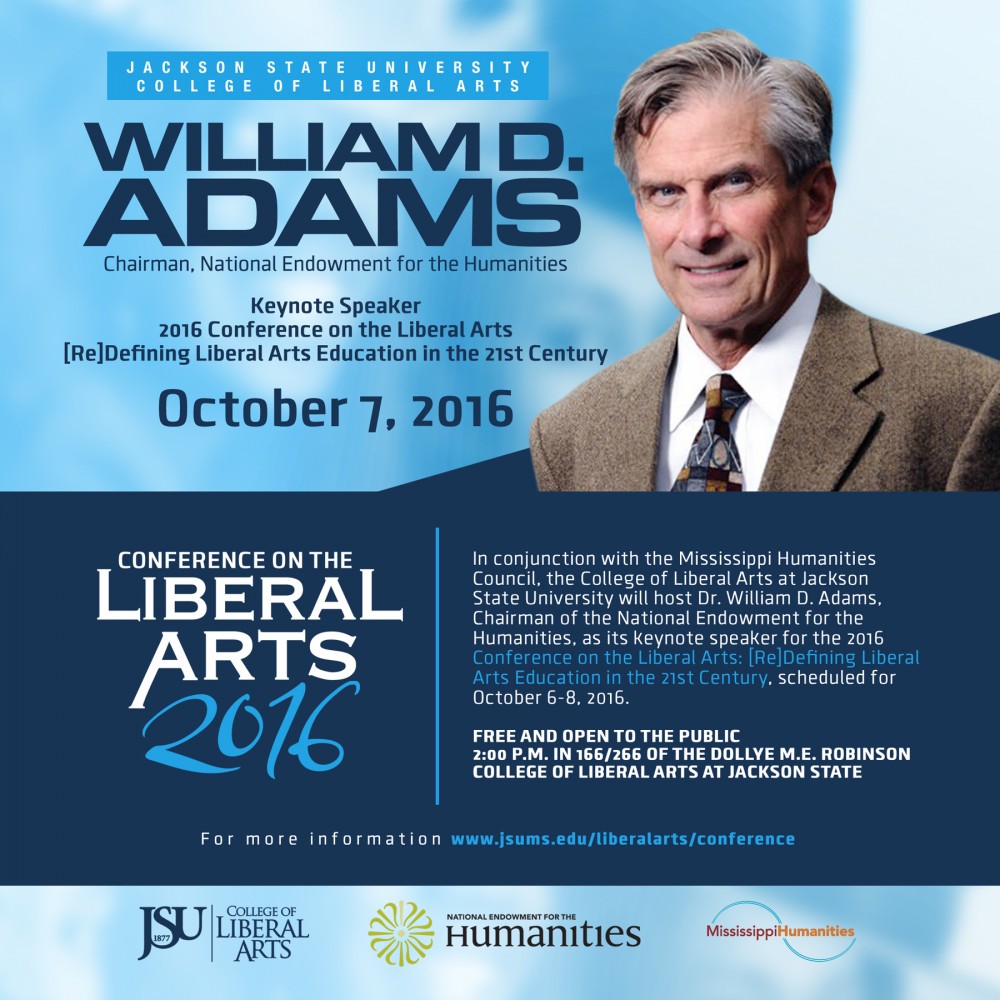Center to Participate in Liberal Arts Conference at Jackson State University
Center to Participate in Liberal Arts Conference Presented by Jackson State University
Faculty, staff, and an alumnus of the Center will participate in the [Re]Defining Liberal Arts Education in the 21st Century Conference on the Liberal Arts next week at Jackson State University. The Conference, to be held October 6 – 8, will include a keynote address by Dr. William D. Adams, Chair of the National Endowment for the Humanities. JSU’s description of the conference:
The purpose of this first conference, scheduled for October 6-8, 2016, is to explore the reasons Liberal Arts disciplines are undervalued by students, parents, and others and to examine how we might [re]define or reframe our roles in an increasingly multi-disciplinary and inter-disciplinary academic world in which job preparedness appears to be the goal of higher education rather than critical and analytical thinking and writing. At the conference, we will also discuss the role of and need for a conference on the liberal arts and how we might move forward.
On Friday, October 7, a series of free plenary sessions will be available to the general public, including a keynote address by Dr. William D. Adams, Chairman of the National Endowment for the Humanities, at 2 p.m. in the JSU College of Liberal Arts room 166/266. Chairman Adams will discuss “the ways a robust liberal arts education can help students confront the opportunities and concerns of the 21st Century.”
See the full schedule here.
Center people will participate in two panels:
Documentary Work in Mississippi
JSU Student Center Theater
Thursday, October 6, 1:30-2:45 p.m.
Turry Flucker, Mississippi Arts Commission (and SST alum)
Andy Harper, Southern Documentary Project, University of Mississippi
David Wharton, Center for the Study of Southern Culture, University of Mississippi
Sara Wood, Southern Foodways Alliance, University of Mississippi
Moderator: Jennifer Joy Jameson, Mississippi Arts Commission
Documentary work has a significant history in Mississippi, with photographers, recording engineers, oral historians, folklorists, and filmmakers all showing great interest in the state’s people since the early twentieth century. In the twenty-first century, many young people grow up as documentarians, almost constantly recording themselves and their surroundings with photography and film. In truth, one could argue that doing documentary work in thoughtful, responsible ways is a new form of literacy. We propose a discussion panel about contemporary documentary work in Mississippi and how it relates to education, scholarship, social justice, and cultural tourism. Questions include many of the following: What are the best subjects for documentary work, and what are the reasons for such work? Who decides the ethics of taking pictures, audio, or video? How is documentary work responsible to the subjects of that work, and what effect does documentary work have on a community? How does documentary work function as an archival resource as technology continually changes? How does documentary work intersect with political action? How do we best teach about documentary work in an age when so many people are doing such work outside academic settings? How do we make accessible the best documentary work in an age when so many people are sharing their work online? What are the best examples of good, responsible, compelling documentary work? And are there ways good documentary work can serve the purposes of education, greater cultural understanding among groups, and cultural tourism?
Teaching about Mississippi in Trying Times
JSU Student Center Theater
Friday, October 7, 9:00-10:15 a.m.
Bridget Smith Pieschel, Mississippi University for Women
D’Andra Orey, Jackson State University
Jason Ward, Mississippi State University
Otis Pickett, Mississippi College
Moderator: Ted Ownby, University of Mississippi
This will be a discussion about teaching about Mississippi while living in times of struggle in the state. Maybe all times are in fact trying, but there are special challenges—and special opportunities—about teaching classes about Mississippi and the American South in a period with controversies over the Mississippi flag, over new laws passed by the 2016 Mississippi legislature, over language in American political discussion, over university and state symbols, and over moments of violence inside and outside the state. We live in exciting, frustrating times with new questions almost every day about rights and inclusiveness, race, gender, and sexuality, free speech and hate speech, religion and the definition of values, and memory, power, and symbols. The panel brings together scholar-teachers at five Mississippi colleges and universities to discuss how they address such issues as citizens of their institutions. How do they address such issues in their classes? Outside their classes? In reading and research assignments? With parallels to other movements and issues? How do activism and teaching work together, or do they move in separate directions with separate languages and goals? And how do teaching and scholarship reflect, respond to, and contribute to our discussions?


